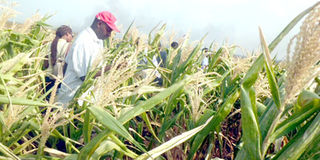Researchers tackle new pest challenge in maize breeding

In addition to ability to withstand drought, the research focuses on the maize pests. Photo by Lominda afedraru
Ugandan scientists who have been conducting research on drought-resistant maize varieties for the last three years, seem to be faced with the challenge of the stem borer, which is destroying farmers’ fields.
The researchers from National Agricultural Resources Research Institute (NaCRRI) in Namulonge are developing the maize varieties under the Water Efficient Maize for Africa (WEMA) project. But after noting infestation of the pest in most farmers’ fields throughout the country, they have included a strategy to curb the pest.
Stem borer is highly-prevalent in Uganda and much of sub-Saharan Africa. It affects leaves, stems, roots and the cob. The common species in Uganda are Chilo partellus and Busseola fusca.
Ms Grace Abalo, a maize breeder at NaCRRI, says, they aim at producing a maize variety to address both challenges of drought and the stem borer pest, which farmers are faced with. So, they are now introducing Bacillus thurigiensis (Bt) gene into maize. She explains that the Bt gene extracted from the DNA of soil-borne bacterium, selectively targets the borer, and not any other insects or even non-insect organisms.
Farmers’ use
A facility has been set up at Namulonge for mass rearing of the borers, which will be used for evaluating the crop’s resistance to the insect damage. Then, at trial field sites in Kasese, these insects will be mimicked on the test varieties to ascertain their resistance. Those that will repel the stem borers will be considered for farmers’ use.
Dr Godfrey Asea, the National Project Coordinator and Principal Investigator, says since drought is not the only one problem maize faces in Uganda, they decided to test varieties against other challenges. “The long term resultant maize variety will be a new Dt-Bt with naturally inbuilt resilience to maize stem borers and drought, tolerance productivity and production levels for the key staple crop,” he said.
The first stage in the process began in November 2012, when the team underwent compliance training, to prepare them to the trials in accordance with biosafety and environmental regulations. If successful, the trait from the resistant varieties will be transferred to our locally-preferred maize varieties.
==========================================================
Farmers receive equipment to fight pests
Coffee farmers in Masaka and Lwengo districts have received equipment from Uganda Coffee Development Authority (UCDA) as part of a drive to combat the black twig borer. It was in response to the farmers making an outcry over the pest invasion, which led to drastic drops in yields in two seasons of 2012.
UCDA regional coordinator, Mr Robert Ssentamu, handed over the equipment to the farmers at a meeting held at Nkalwe village in Lwengo District. It included two motorised spray pumps, cutters and 10 jerry cans of drugs, gloves and gumboots.
He said the motorised spray pumps will enable the farmers cover larger area than if they used the manually operated ones. In addition, UCDA has partnered with the agricultural departments in the two districts as well as Rakai, Sembabule and Kalungu for a sensitisation programme of farmers on pest.
-Issa Aliga




